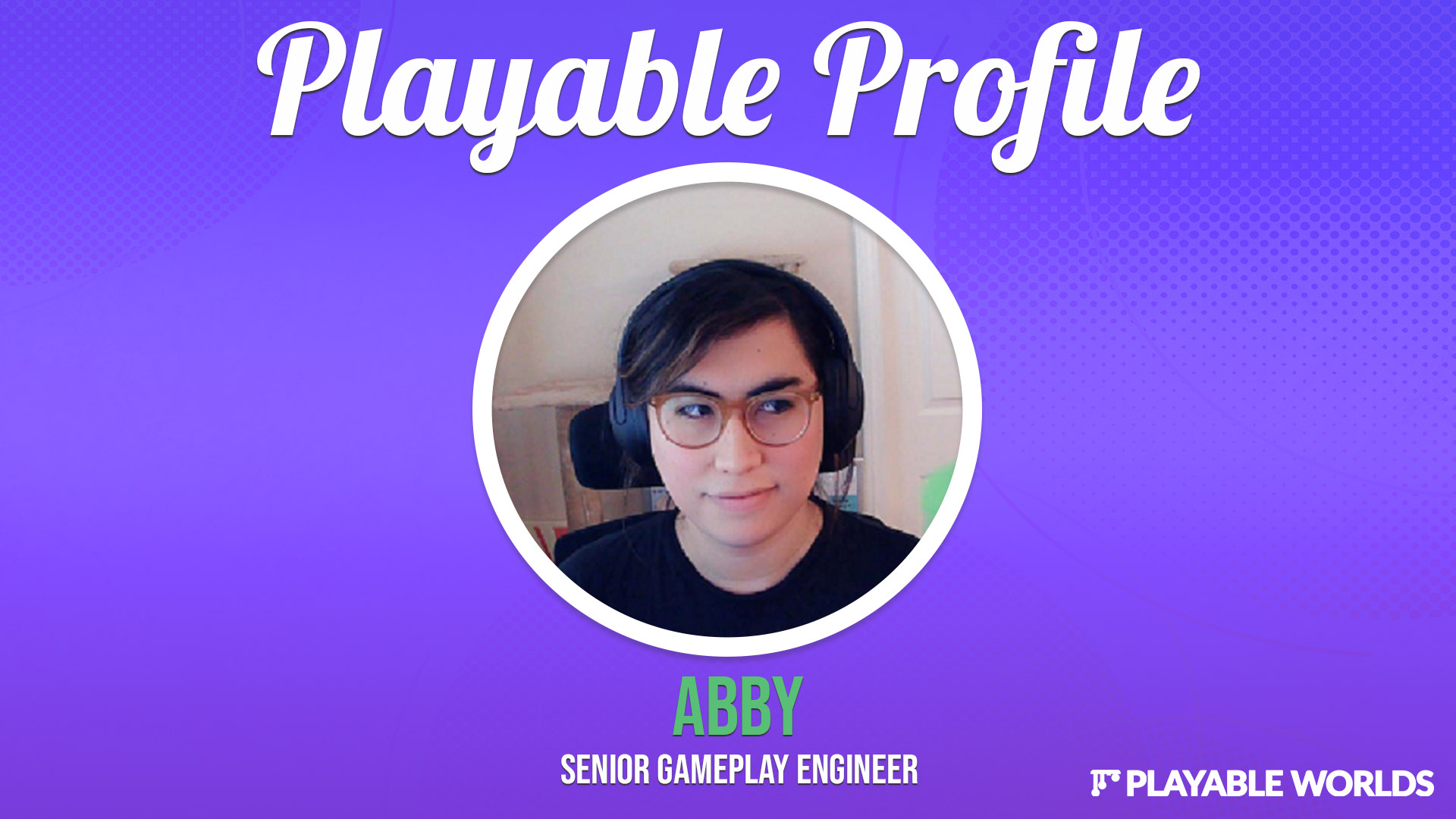Welcome to another edition of our Playable Profile series! We chatted with one of our senior gameplay engineers, Abby! While she is newer to the gaming industry, she has years of experience programming that helped her get to where she is now. She even has some great advice if you’re looking to get into the industry, too!
Read on to meet Abby!
VioletLight: Let’s get started! Tell me a little about yourself and your role at Playable Worlds.
Abby: I’m Abby. I am a senior gameplay engineer at Playable Worlds. Gameplay engineers work on a lot of things, we’re all over the code. Some engineers specialize – you have graphics engineers, networking, and simulation. Gameplay has to work to connect all the pieces, so we’re in a lot of the code at different points in the production. For example, last year, I was working on a lot of core stuff for our scripting system, while this year I’m working on a bunch of UI stuff, getting the UI working. It’s really all over the place.
V: What first got you interested in engineering?
A: Really just video games, for a long time I’ve really wanted to make games. I am actually a self taught engineer, so I have no formal schooling or training. I started out learning how to program in JavaScript, and eventually picked up other languages and skills. At first I worked developing web applications, since those jobs were easier to find and allowed me to find stability while I learned more on the side. Eventually I became really experienced working with JavaScript and more specifically TypeScript, which is the scripting language we use here. Then I had enough experience now to where I could apply here as a sort of specialist to work on the scripting system.
V: What kind of applications did you work on before?
A: I worked on all kinds of stuff, mainly web servers and pages, a lot of web ads code too, that’s usually the really common web work. Right before here I worked at Walmart for a year and a half working on internal tools. That was weird and interesting, because up to that point, I was used to handling hundreds, maybe 1000s of users. But Walmart has millions of employees, so even if it’s an internal tool, everything you did had to scale to millions of people.
V: That’s definitely helpful for games, though, when you have to scale up for a huge amount of players.
A: Yeah absolutely, I often think that games are the final form or the final boss of programming. It feels like you have to use everything you’ve learned previously to make it not only work, but also be hyper efficient, and be super diverse. It needs to work on all machines and be very resilient, so players aren’t crashing and of course, the game has to be good. So it’s a huge challenge.
V: Tell me a little bit more about how your role differs from other engineers.
A: At Playable Worlds, we’re mainly responsible for the scripting system and code. That’s our biggest priority and responsibility. We have client engineers, who work on the game client that gets downloaded to your computer. Server engineers, who work on all the servers and networking, and all of the planning and architecting that it takes to run an MMO at a huge scale. Then we have the gameplay engineers, who work on the actual gameplay content such as how inventory should work, or even something as simple as a weapon attack.
V: What’s the most challenging part of being a gameplay engineer?
A: Right now, the most challenging part is trying to iterate fast enough to get it right early. We’ve been working on getting all of our core systems really solid so that further development is easier and faster. At least, that’s the goal!
V: Since you have worked in a lot of different industries, do you have a favorite part of working in game development versus those other roles?
A: In general, even in the other roles, I’ve always liked getting feedback from users and getting to see my work used or played. That’s probably the most exciting, seeing the user or player reactions. But I also like lurking on the community forums and discord, and seeing all the wild ideas that our future players come up with.
V: Can you share a rewarding or challenging experience that has happened during your career?
A: To me, all of my previous work has been working towards getting into the games industry and working on games. I learned to code because I wanted to make a game, but I ended up doing other things. While I was doing that though, I was learning and trying to make my own games on the side. All of that hard work led to me being hired at Playable Worlds, which is my first job in the gaming industry, so working here is basically its own reward. It’s very exciting to finally reach your goals.
V: That means so much to put in the work. It’s really hard to get into the gaming industry sometimes, so the fact that you just kept persevering and ended up in games, that can’t be understated.
Let’s get into some fun questions. What games are you playing right now?
A: I play very few games right now, so I’ve been actively trying to play games that I wouldn’t normally play. My favorite games though are Escape from Tarkov and Rocket League. I tend to like games that are either hyper competitive or really challenging. Although I haven’t played it, I think I would really like Dark Souls. That sounds like the kind of challenge that if I had the time, I would put more hours into. Actually my partner bought Elden Ring for me, but it’s still just on the shelf!
V: I’ve heard it’s pretty hard! Have you ever played any MMOs?
A: Escape from Tarkov is technically an MMO, and from a game design perspective I tend to see it more like an MMO than a lot of other people might. A lot of people may see it as just a first person shooter, but there’s trading, a flea market, and a lot of multiplayer interaction.
I’ve played a little bit of Final Fantasy 14 and World of Warcraft, though not recently. I used to play the series a lot as a kid. Me and my friends were also really active on Gaia Online, which was like a community gaming forum, that even included little flash games using your avatar.
V: What other hobbies or interests do you have outside of games?
A: I watch a lot of anime and read a lot of manga. I also try to collect as many older games as I can. I’m constantly going to the shops around San Diego that sell games and finding gems. I found Kirby 64: The Crystal Shards last year and I was really really excited to play that again.
V: That’s awesome. One last question: What advice would you give to someone trying to get into the game industry?
A: I can only speak for engineers, because I know it’s radically different for a lot of people, but try to complete a project. The more code you’ve written in a complete project the better, especially for a programmer just starting out to say, look, this is what I can do. No one has to guess if you can do it or not, you’ve shown that you’ve executed that before, even if you haven’t been in a games company before.
Also specialize in something that you like. I happen to specialize in scripting, because that’s what I learned and what I like.
V: Being able to show off your skills is really useful, and that’s common feedback I’ve been getting from the engineers. Make something and see how it works.
A: Bonus points if you can write something from scratch, even if it’s super simple. It shows that you’re willing to research, but then you could also implement it.
V: Is there any other part of game development that you would be interested in learning at any point? I know that you say you focus on scripting, but is there anything once you’ve gotten into this role that you find really interesting and fascinating to work on?
A: Part of the reason I was especially happy to get a gameplay engineer role versus server engineering, is that gameplay gets to work closely with the designers. If you imagine design and engineering on a spectrum, on one side you have the Client and Server engineers, who mostly work in code. Next the Gameplay engineers are working mostly in code but also a bit of design. Even though a design calls for a specific thing, you need to have a little intuition as part designer and programmer to say, I should code it this other way instead. Then there’s Technical Designers, who mostly design and do a bit of coding. And finally there are Designers, who focus on the actual game design and interactions, documenting what the game should play like in detail. I really like that I am somewhere on that spectrum and I’m learning more about game design to one day move to the design team and work more in technical design.
V: That’s awesome, thanks so much for chatting with me today, Abby!
We hope you enjoyed this latest interview! Have more questions for Abby or our engineering team? Share with us on social media!


